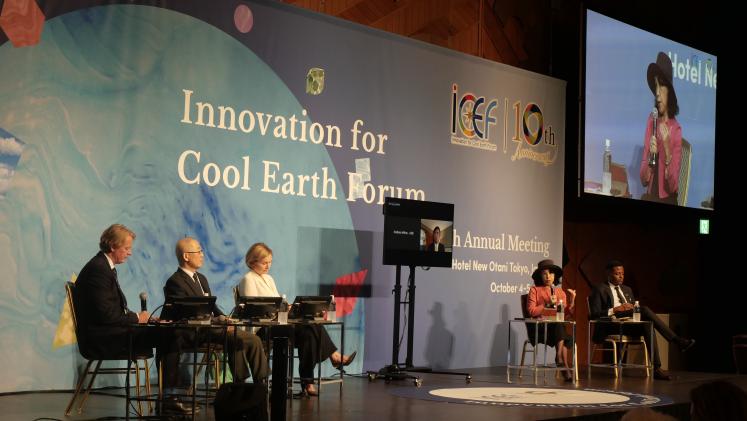On 4 October 2023, Shinobu Yume Yamaguchi (Director, UNU-IAS) presented in a plenary session at the 10th Annual Meeting of the Innovation for Cool Earth Forum (ICEF), a platform for discussion between industry, academia and government leaders on innovation-based solutions to address climate change.
Focusing on the theme Green Transformation (GX) Together, the plenary session discussed approaches to realise inclusive transition by engaging all countries, regardless of their level of economic development — and all industries, regardless of their carbon intensity.
Acknowledging that plentiful energy, mostly from fossil fuels, had lifted more than one billion people out of poverty in the past 25 years, Eija-Riitta Korhola (ICEF Steering Committee member; Delegate of the Consultative Commission for Industrial Change European Economic and Social Committee) stressed the need for low-carbon energy that could outcompete fossil fuels. This would enable all countries to make the transition, and require dramatically increasing global investment in clean research and development.
Prof. Yamaguchi explained that a just transition could constitute a breakthrough solution for achieving multiple SDGs simultaneously, embodying the principle of “leaving no one behind” in the transition to a greener world. Drawing on UNU-IAS research, including an issue paper prepared by Think7 Japan for G7 countries and partners, Prof. Yamaguchi emphasized several specific recommendations. First, it is important to strengthen social safety nets, particularly for workers in carbon-intensive industries, to mitigate disruptions caused by the transition. Policymakers should also promote employability and continuing education, reskilling, and training; commit to increasing national budget allocations for climate finance; and mobilise public and private finance flows. Prof. Yamaguchi highlighted the need to establish a people-centred and gender-sensitive monitoring, reporting, and evaluation process. Recognizing that the journey towards sustainability and climate equity was complex, she argued that we must undertake it together.
Andrew Jeffries (Just Energy Transition Partnership Advisor, Energy Sector Office, Asian Development Bank) argued that developing countries could focus on decarbonizing their existing energy systems over time, but rapidly growing developing economies faced the twin challenges of meeting rapid energy demand growth and simultaneously decarbonising.
Speaking from the perspective of a private financial institution, Tomohiro Ishikawa (Chief Regulatory Engagement Officer, Mitsubishi UFJ Financial Group) introduced the notion of stranded assets — the risk that certain types of assets could be stranded, or their value depleted due to policies such as carbon taxes. He also discussed the risk of a transition to a low carbon economy creating “stranded humans”, and highlighted the importance of an economy-wide transition to a net-zero society to avoid this scenario.
Humphrey Mrema (Chairman, Youth Survival Organization) discussed ways to realize inclusive, just transition to empower young people in the Global South, including Sub-Saharan Africa and other developing economies. He highlighted the need to invest in education and training focused on green skills that would help young people to secure green jobs.
In closing remarks, Hoesung Lee (ICEF Steering Committee member; Former Chair, Intergovernmental Panel on Climate Change; Endowed Chair Professor, Graduate School of Energy and Environment, Korea University) stressed the importance of the transition to net-zero and called for every effort to be made towards achieving that goal. He emphasized the leading role that governments should play in achieving green transformation.
The meeting was organised by the Ministry of Economy, Trade and Industry of Japan (METI) and the New Energy and Industrial Technology Development Organization (NEDO) of Japan under the theme “Innovation for Just, Secure and Sustainable Global Green Transformation (GX)”.

